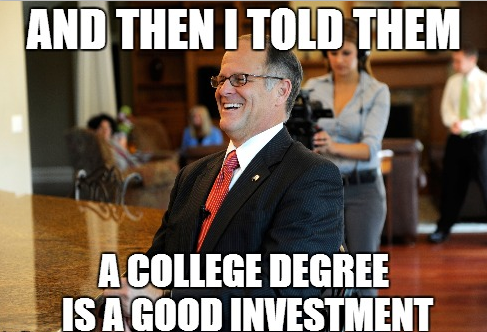NDSU President Dean Bresciani: College Isn't About Careers, You Philistines

North Dakota has one of the highest rates of high school graduates who go on to college in the nation. Roughly 66 percent of our high school graduates go on to college, and I think it’s fair to say that the expectation of most of the parents and students have as they shoulder the expense of college attendance is that a college degree will help the students with their careers.
But displaying a level of disconnect that can only come with holding down a six-figure salary working in academia, NDSU President Dean Bresciani says careers isn’t what college is about.
“Preparation for a first job out of college and career are important,” he writes in a ponderous newspaper column. “But that has never been the central value of education in the U.S.”
“American higher education started with nine colonial colleges founded from 1636 to 1769,” Bresciani continues. “They were intended to, in simple terms, educate the “whole person.” Preparation for careers was an outgrowth rather than goal of American higher education.”
That’s a noble idea, but it is completely out of touch with modern realities.
If higher education isn’t about preparation for a career field, if it isn’t about enhancing earning power, then why in the world would anyone shoulder the exorbitant cost of obtaining a degree these days?
What’s ironic about Bresciani’s argument is that the go-to argument for justifying the skyrocketing cost of higher education is the idea that it is all paid back by higher earnings. After all, if you have a college degree, you can command more compensation in the job markets.
The problem, of course, is that a lot of students don’t graduate. The six-year graduation rate (for four year degrees) at North Dakota’s two largest universities is roughly 50 percent. Nationally, “60 percent of the growth in college graduates from 1992 to 2008 ended up working in low-skill jobs, the kind of jobs for which the Bureau of Labor Statistics regards a college degree as irrelevant,” wrote Peter Wood for the Chronicle of Higher Education in 2010.
Wood attributes arguments like Bresciani to “scorn for the philistines who would reduce the ‘value’ of a college degree to the job prospects and earnings of graduates.”
“Never mind that higher education has been busy selling itself to the public in precisely those terms for the last fifty years and that the official position of the Obama administration is that our ‘national competitiveness’ depends on a huge expansion in the number of young people who earn college degrees,” he writes.
Bresciani’s column is a work of arrogance. He is the chief executive of an institution of higher education that has doubled tuition prices in the last decade, even while gobbling up nearly twice as much in tax dollars. For him to tell us that we should divest ourselves of this silly notion that college is about career enablement is downright galling.




